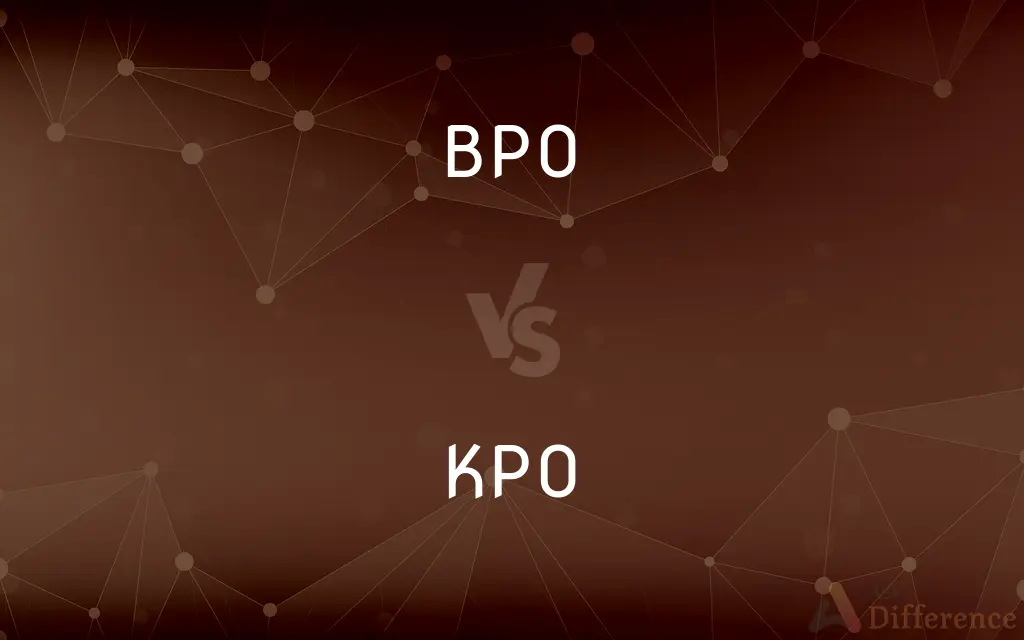BPO vs. KPO — What's the Difference?
By Tayyaba Rehman — Published on October 20, 2023
BPO (Business Process Outsourcing) focuses on contracting non-core business activities; KPO (Knowledge Process Outsourcing) deals with outsourcing knowledge-intensive activities.

Difference Between BPO and KPO
Table of Contents
ADVERTISEMENT
Key Differences
In summary, BPO revolves around the execution of operational and administrative tasks, providing support for the core activities of the business, while KPO is more analytical and strategic, dealing with the application of specialized knowledge and expertise to drive innovation and business value. Both BPO and KPO offer organizations the opportunity to optimize resources, enhance efficiency, and access specialized skills and knowledge.
Tayyaba Rehman
Oct 20, 2023
BPO and KPO are prominent forms of outsourcing but serve distinct purposes. BPO is primarily associated with outsourcing of non-core, repetitive business activities such as customer support and data entry, to achieve cost reduction and efficiency. BPO allows organizations to focus on their core competencies while outsourcing secondary tasks to specialized service providers, often in different countries.
Tayyaba Rehman
Oct 20, 2023
While BPO focuses on process expertise and efficiency, emphasizing quantity and the execution of standardized tasks, KPO emphasizes quality and the application of specialized knowledge and expertise. BPO is generally more volume-driven, while KPO is more value-driven, requiring a deeper understanding of complex business processes and industries.
Tayyaba Rehman
Oct 20, 2023
KPO, on the other hand, refers to the outsourcing of knowledge-intensive and information-related business activities such as research and development, investment research, and legal processes. KPO demands highly skilled and knowledgeable personnel, as it involves handling of high-end processes requiring specialized domain expertise. KPO enables companies to access specialized knowledge and expertise, thus contributing to enhanced business value and innovation.
Tayyaba Rehman
Oct 20, 2023
Comparison Chart
Focus
Non-core, repetitive business activities.
Knowledge-intensive, information-related business activities.
Tayyaba Rehman
Oct 20, 2023
ADVERTISEMENT
Required Skill Level
Lower, emphasis on process expertise.
Higher, requires specialized domain knowledge.
Tayyaba Rehman
Oct 20, 2023
Objective
Cost reduction and efficiency.
Access to specialized knowledge and expertise, innovation.
Tayyaba Rehman
Oct 20, 2023
Nature
Volume-driven, standardized tasks.
Value-driven, more analytical and strategic.
Tayyaba Rehman
Oct 20, 2023
Examples
Customer support, data entry.
Research and development, legal processes.
Tayyaba Rehman
Oct 20, 2023
Definitions
BPO
BPO aims to reduce costs and improve operational efficiency by delegating secondary tasks.
Implementing BPO allowed the organization to focus more on core business functions.
Tayyaba Rehman
Oct 01, 2023
ADVERTISEMENT
KPO
KPO involves outsourcing activities that require specialized knowledge and analytical skills.
The financial firm used a KPO service for its investment research needs.
Tayyaba Rehman
Oct 01, 2023
BPO
BPO services often include customer support, data entry, and other administrative tasks.
Through BPO, the routine data processing tasks were managed effectively.
Tayyaba Rehman
Oct 01, 2023
KPO
KPO services can include R&D, business and market research, and learning solutions.
Pharma companies utilize KPOs for research and development activities.
Tayyaba Rehman
Oct 01, 2023
BPO
BPO can be offshore, nearshore, or onshore, depending on the location of the service provider.
The firm opted for offshore BPO to capitalize on the cost advantage.
Tayyaba Rehman
Oct 01, 2023
KPO
KPO demands a higher level of domain expertise and is usually more value-driven.
For high-quality market research, organizations tend to prefer KPO services.
Tayyaba Rehman
Oct 01, 2023
BPO
BPO is primarily process-driven, focusing on the execution of standardized tasks.
The company outsourced its call center operations to a BPO provider specializing in customer interactions.
Tayyaba Rehman
Oct 01, 2023
KPO
KPO focuses on knowledge-intensive business processes and decision-making activities.
Legal firms often resort to KPO for specialized legal services and consultations.
Tayyaba Rehman
Oct 01, 2023
BPO
BPO involves outsourcing non-core operational activities to external service providers.
The company engaged a BPO firm to handle its customer service operations.
Tayyaba Rehman
Oct 01, 2023
KPO
KPO aims to provide businesses with strategic insights and specialized expertise.
The company collaborated with a KPO to gain deeper insights into consumer behavior.
Tayyaba Rehman
Oct 01, 2023
FAQs
Does KPO require specialized knowledge?
Yes, KPO requires specialized domain knowledge and focuses on knowledge-intensive processes.
Tayyaba Rehman
Oct 20, 2023
Is BPO related to non-core business activities?
Yes, BPO typically involves outsourcing non-core, operational, and administrative business activities.
Tayyaba Rehman
Oct 20, 2023
Can BPO be offshore?
Yes, BPO can be offshore, nearshore, or onshore, depending on the location of the service provider.
Tayyaba Rehman
Oct 20, 2023
Is KPO value-driven?
Yes, KPO is typically more value-driven, focusing on delivering specialized knowledge and strategic insights.
Tayyaba Rehman
Oct 20, 2023
Can BPO improve operational efficiency?
Yes, BPO aims to improve operational efficiency and reduce costs by outsourcing non-core tasks.
Tayyaba Rehman
Oct 20, 2023
Can BPO enhance focus on core business activities?
Absolutely, by outsourcing non-core activities through BPO, companies can better focus on their core business functions.
Tayyaba Rehman
Oct 20, 2023
Does BPO focus on quantity?
Typically, BPO is more volume-driven, focusing on the execution of standardized, repetitive tasks.
Tayyaba Rehman
Oct 20, 2023
Does KPO contribute to innovation?
Yes, KPO can contribute to innovation by providing specialized knowledge and analytical skills.
Tayyaba Rehman
Oct 20, 2023
Is BPO typically process-driven?
Yes, BPO is primarily process-driven, emphasizing the execution of standardized operational tasks.
Tayyaba Rehman
Oct 20, 2023
What are the types of services provided by KPO?
KPO services include business and market research, legal processes, investment research, and R&D.
Tayyaba Rehman
Oct 20, 2023
Is KPO suited for analytical and strategic tasks?
Yes, KPO is well-suited for analytical and strategic tasks requiring specialized knowledge and expertise.
Tayyaba Rehman
Oct 20, 2023
Is cost reduction a primary goal of BPO?
Yes, one of the main objectives of BPO is to achieve cost reduction.
Tayyaba Rehman
Oct 20, 2023
Can KPO offer learning solutions?
Yes, KPO can offer learning solutions and other services that require high levels of domain expertise.
Tayyaba Rehman
Oct 20, 2023
Author Spotlight

Written by
Tayyaba RehmanTayyaba Rehman is a distinguished writer, currently serving as a primary contributor to askdifference.com. As a researcher in semantics and etymology, Tayyaba's passion for the complexity of languages and their distinctions has found a perfect home on the platform. Tayyaba delves into the intricacies of language, distinguishing between commonly confused words and phrases, thereby providing clarity for readers worldwide.

















































